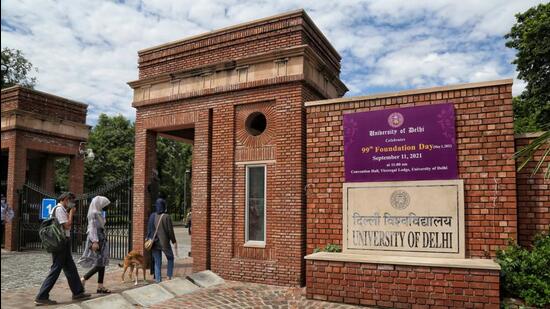Delhi University’s PG syllabus cuts on religion, caste, LGBTQ+ issues, and Pakistan spark faculty backlash, raising concerns over academic freedom and ideological interference.
On 25 June 2025, the Standing Committee of the University of Delhi (DU) proposed several contentious changes to the postgraduate syllabi of Geography, Sociology, and Political Science. The revisions include the removal or significant reworking of content related to religion, caste, LGBTQ+ issues, and the study of Pakistan. The changes have triggered widespread criticism from faculty members, with further discussion scheduled in the upcoming meeting on 1 July.
In the Department of Geography, three major papers were affected. In the elective paper Territorial Bases of Politics in India, the committee objected to Unit 3, titled “Internal Conflicts and Problems of Nation Building,” which addressed religious conflicts. A key reading, The Production of Hindu Muslim Violence in Contemporary India, was removed. In Social Geography, Unit 4 on “Distribution of SC Population” was eliminated. According to committee members, this decision was made to de-emphasise caste-related material. Additionally, Vulnerability and Disaster, another elective, was completely removed from the syllabus.
The Sociology syllabus also saw significant intervention. In Introduction to Sociological Theory, the committee questioned the absence of Indian thinkers and suggested their inclusion. Objections were raised regarding the inclusion of the reading Weston, K. (1997). Families We Choose: Lesbians, Gays, Kinship, as same-sex marriage is not legally recognised in India. In Sociology of Religion, Unit IV on Religious Authority and Organizations was flagged for using academic terms such as “church,” “sect,” and “cult.” Members questioned why terms like “rishi-muni” were excluded. Despite faculty clarification that these were standard sociological terms, the committee still recommended revision.
Urban Sociology also faced changes. The committee argued that Unit 2 focused excessively on violence. Key readings addressing religion and caste were removed, including The Muharram Procession of Mumbai, Animating Caste: Visceral Geographies of Pigs, Caste and Violent Nationalisms in Chennai City, and Deceptive Majority: Dalits, Hinduism, and Underground Religion.
Some faculty members have raised concerns about the committee’s role in mandating syllabus revisions.
The Standing Committee’s direction to the Departments of Geography and Sociology to change their syllabi defies academic rationale and is an act of overreach. While the Standing Committee can share inputs and feedback with the departments, it cannot direct the departments to remove papers and readings without giving academic justification.”
said Rudrashish Chakraborty, Associate Professor at Kirori Mal College and elected member of the DUTA Executive (2023–25).
The Political Science syllabus came under the most scrutiny. Faculty members were directed to ensure the content remained “India-centric” and avoided material that “glorifies Pakistan.” This instruction aligns with Vice Chancellor Yogesh Singh’s earlier stance amid recent geopolitical tensions.
Dr. Monami Sinha opposed the changes, stating,
“It is imperative to study Pakistan in detail because, pedagogically, we need to train our students and foster scholarship on Pakistan, as it remains one of India’s constant foreign policy challenges.”
Four electives relating to China, Pakistan, and Islam in international relations were removed. These included Pakistan and the World, China’s Role in the Contemporary World, Islam and International Relations, and Pakistan: State and Society. In Religious Nationalism and Political Violence, the topic “Sangha politics, civil warfare and the peace process” was removed, along with the reading by Blom Hansen on Hindu nationalism and violence.
Read Also: DU Student Murdered by her Classmate; Body Burnt at Delhi’s Sanjay Van.
Image Credit: Times of India
Yashika Jain




